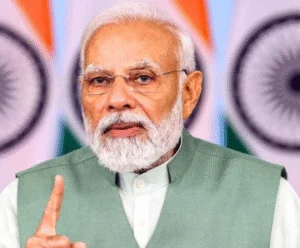
PM Modi suspends the Indus Waters Treaty, ensuring its water resources benefit its own citizens. PM Modi declares, “India’s water will now flow for India"
India Suspends Indus Waters Treaty Amid Rising Tensions
PM Modi emphasized to prioritize domestic water needs and that India’s rightful share of water will now be used for its own development, marking a significant shift in diplomatic policy. In a landmark decision, Prime Minister Narendra Modi has announced the suspension of the Indus Waters Treaty, a decades-old water-sharing agreement between India and Pakistan. The action was taken in reaction to rising tensions after the 26-person Pahalgam terror incident on April 22.
PM Modi’s Statement: “India’s Water Will Flow for India”
Speaking at an ABP News event, PM Modi declared, “Earlier, even India’s rightful share of water used to flow out; now, India’s water will flow for India, stay for India, and serve India.” The statement underscores India’s commitment to prioritizing domestic water needs over treaty obligations.
Strategic Water Diversion and Hydropower Expansion
India has suspended water flow through the Chenab River’s Baglihar dam, a crucial hydropower project in Jammu and Kashmir, in the wake of the suspension. Six significant hydropower projects, including Sawalkot (1,856 MW), Pakal Dul (1,000 MW), Ratle (850 MW), Bursar (800 MW), Kiru (624 MW), and Kirthai-I & II (1,320 MW combined), are currently being expedited by the government. These projects aim to boost irrigation, drinking water availability, and power generation, ensuring India’s water resources benefit its own citizens.
Pakistan’s Response and Global Reactions
Pakistan has expressed deep concern over the sudden drop in Chenab River inflows, warning of a 21% water shortage during the early Kharif season. Islamabad has threatened severe diplomatic retaliation, with some officials hinting at military escalation if India permanently diverts water flow. Meanwhile, global powers, including the United States, European Union, China, and Russia, have urged de-escalation through dialogue.
World Bank’s Involvement and Financial Implications
The World Bank, a key signatory of the treaty, has initiated discussions with PM Modi regarding the suspension. India is also lobbying multilateral agencies, including the IMF and Asian Development Bank, to reassess financial aid to Pakistan following the terror attack. The move could have far-reaching economic consequences for Pakistan, which is already struggling with debt and inflation crises.
What’s Next?
India’s decision to suspend the Indus Waters Treaty marks a historic shift in its foreign policy. With hydropower expansion underway, the government aims to strengthen national water security while maintaining strategic leverage over Pakistan. As tensions rise, the world watches closely, anticipating further developments in this high-stakes geopolitical conflict.
Conclusion
India’s decision to suspend the Indus Waters Treaty marks a significant shift in its approach to water resource management and sovereignty. By prioritizing domestic needs, the country reinforces its commitment to ensuring sustainable access to vital water sources for its population and industries. This move signals a strategic recalibration, emphasizing national interests amid evolving geopolitical and environmental challenges.
While the treaty has historically governed water-sharing agreements with Pakistan, India’s assertion of sovereignty underscores the urgency of securing its own water future. The suspension could lead to intensified diplomatic negotiations, paving the way for a new framework that aligns with contemporary demands and climate realities. Additionally, this bold step may inspire other nations to reassess legacy agreements that no longer serve their best interests.
However, the decision is bound to have ramifications, potentially reshaping regional dynamics. As the government navigates the complexities of water diplomacy, balancing national priorities with cooperative engagements will be key. If managed effectively, this shift could lead to improved infrastructure, enhanced conservation efforts, and long-term sustainability. India’s stance reflects a broader global trend of nations taking decisive action to safeguard their resources in an era of increasing environmental and geopolitical uncertainties.
Stay informed with the latest news and updates – only on Rapido Updates.